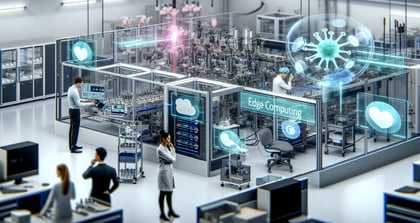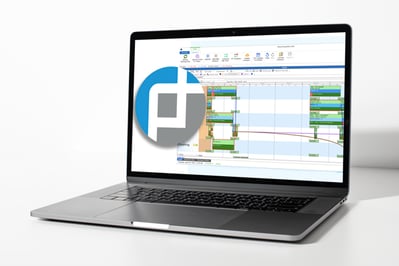Edge Computing for Real-Time Insights
Production schedulers play a pivotal role in ensuring operations run smoothly, meeting demand, and maintaining quality standards. However, with the complexity of modern supply chains and the need for real-time decision-making, traditional approaches to scheduling may fall short. This is where edge computing steps in, offering a transformative solution for gaining actionable insights in real-time.
In this blog post, we'll explore the concept of edge computing and its application in medical manufacturing, particularly in the context of production scheduling. Moreover, we'll look into the integration of edge computing with leading ERP (Enterprise Resource Planning), SCM (Supply Chain Management), and MES (Manufacturing Execution Systems) platforms like SAP, Oracle, Microsoft, Kinaxis, Aveva, and others, with a special focus on PlanetTogether.

Edge Computing
Traditionally, data processing in manufacturing occurred in centralized systems, often leading to latency issues and delays in decision-making. Edge computing redistributes this processing closer to the data source, allowing for real-time analysis and action at the 'edge' of the network, whether it's on manufacturing equipment, sensors, or other devices.
The Advantages of Edge Computing in Medical Manufacturing
Real-Time Insights: By processing data closer to its source, edge computing enables production schedulers to access real-time insights into manufacturing operations. This empowers them to make informed decisions promptly, improving overall efficiency and responsiveness.
Reduced Latency: With edge computing, there's minimal latency in data transmission and processing. This is crucial in medical manufacturing, where even slight delays can impact production timelines and patient care.
Enhanced Security: Edge computing minimizes data exposure by processing sensitive information locally, reducing the risk of data breaches and ensuring compliance with regulatory standards like HIPAA (Health Insurance Portability and Accountability Act).
Scalability: Edge computing solutions can scale seamlessly to accommodate growing data volumes and evolving manufacturing needs, providing a future-proof infrastructure for medical manufacturing facilities.

Edge Computing Matters in Medical Manufacturing
In a highly regulated industry like medical manufacturing, precision and agility are non-negotiable. Edge computing offers a plethora of benefits tailored to meet these demands:
Real-Time Insights: By processing data at the edge, production schedulers gain access to real-time insights into manufacturing processes. This means instantaneous visibility into machine performance, production rates, and quality metrics, enabling proactive decision-making.
Reduced Latency: In critical manufacturing operations, milliseconds matter. Edge computing drastically reduces latency by minimizing the distance data needs to travel for processing. This translates to faster response times and improved overall efficiency.
Enhanced Security: With sensitive patient data and regulatory compliance on the line, security is paramount in medical manufacturing. Edge computing mitigates security risks by processing data locally, reducing exposure to potential cyber threats inherent in cloud-based solutions.
Improved Reliability: Edge computing ensures continuity of operations even in the event of network disruptions. By decentralizing data processing, manufacturing facilities can maintain functionality autonomously, minimizing downtime and maximizing productivity.
Scalability and Flexibility: Edge computing solutions are inherently scalable and adaptable to evolving manufacturing needs. Whether it's expanding production lines or integrating new equipment, edge platforms can seamlessly accommodate changes without significant infrastructure overhaul.

Integration with Enterprise Systems: A Seamless Ecosystem
To fully harness the power of edge computing, integration with existing Enterprise Resource Planning (ERP), Supply Chain Management (SCM), and Manufacturing Execution Systems (MES) is vital. Among the leading platforms, integration with PlanetTogether and prominent ERP systems like SAP, Oracle, Microsoft Dynamics, Kinaxis, and Aveva holds immense potential.
PlanetTogether Integration: PlanetTogether, renowned for its advanced production scheduling capabilities, serves as the linchpin connecting edge computing with ERP, SCM, and MES systems. Through seamless integration, production schedulers gain unparalleled visibility and control over manufacturing operations.
-
SAP Integration: By integrating PlanetTogether with SAP ERP, production schedules seamlessly synchronize with inventory management, procurement, and quality control systems. Real-time data exchange ensures optimal resource utilization and just-in-time production, minimizing inventory holding costs while meeting stringent regulatory requirements.
-
Oracle Integration: Leveraging PlanetTogether's integration with Oracle ERP, manufacturers gain end-to-end visibility across the supply chain—from raw material procurement to finished product distribution. This enables dynamic scheduling adjustments based on demand fluctuations, ensuring on-time delivery and customer satisfaction.
-
Microsoft Dynamics Integration: Integration between PlanetTogether and Microsoft Dynamics streamlines production planning and execution, facilitating agile decision-making in response to changing market conditions. Real-time insights enable production schedulers to optimize resource allocation, minimize lead times, and maximize operational efficiency.
-
Kinaxis Integration: Integration with Kinaxis enables bi-directional data flow between production scheduling and supply chain planning, fostering collaboration and alignment across departments. This seamless exchange of information empowers production schedulers to proactively address supply chain disruptions and minimize production bottlenecks.
-
Aveva Integration: Integrating PlanetTogether with Aveva MES bridges the gap between production scheduling and shop floor execution, ensuring alignment between planned and actual production activities. This integration enables real-time monitoring of equipment performance, quality metrics, and production progress, facilitating continuous improvement initiatives.
-
As technology continues to evolve, the future of medical manufacturing holds immense promise. Edge computing, with its ability to deliver real-time insights and drive operational excellence, serves as a catalyst for innovation in the industry.
By embracing this paradigm shift and leveraging integration between PlanetTogether and leading ERP, SCM, and MES systems, production schedulers can navigate complexities with confidence, delivering life-saving medical devices and pharmaceuticals with unparalleled efficiency and precision.
Are you ready to take your manufacturing operations to the next level? Contact us today to learn more about how PlanetTogether can help you achieve your goals and drive success in your industry.